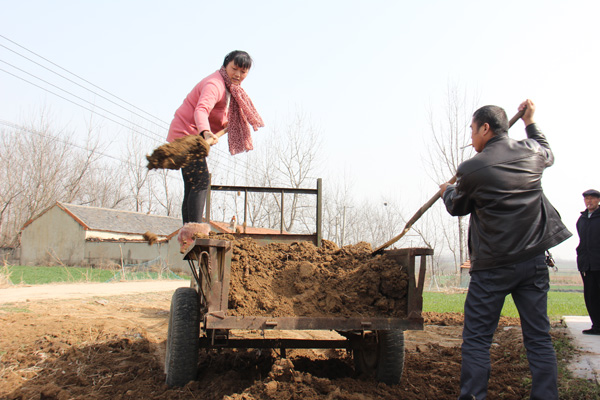Migrant couple straddles life in city, countryside
By Zhu Lixin/Ma Chenguang (China Daily) Updated: 2016-02-23 11:11
 |
|
Zhu Yingqin and her husband Cui Liangjun work to level an open space behind their house in Hegang village, Changfeng county, Anhui province.[Photo by Zhu Lixin/China Daily] |
End of Spring Festival sees family leave village home and return to jobs, urban living
Two days before Monday's Lantern Festival, migrant workers Zhu Yingqin and her husband Cui Liangjun were already busy packing their luggage into their car, ready to return to their city jobs, even though they prefer rural life.
The couple work in Hefei city, the capital of East China's Anhui province, and live in a tiny, cheap room that's perpetually bathed in darkness.
"The earlier we return to the city, the more money we can earn", Zhu said.
Cui carried the luggage to his car, which was stuffed with liquor when they arrived in Hegang village in Changfeng county for the Spring Festival. As a tradition in the countryside, the couple bought two bottles of liquor, each priced at about 60 yuan ($9.20), for the household of each relative they planned to visit.
Even though they brought more than 20 bottles, it wasn't enough. Cui said he planned to buy no more, "since some relatives did not have close relationships with us anymore".
"Money for the liquor was our largest expenditure during the festival," Cui said.
When relatives gathered, they were likely to gamble the day away, but Zhu had banned her husband from participating in the games as "making money has been not easy for us", she said.
Zhu put their quilts in bags and left them on the bed for upcoming visits, saying "we will still come back sometimes since we have grown some wheat in the fields".
She said she wasn't eager to return to their "village in the city", especially to their 10-square-meter rented room. "There is no sunshine all year around in the room, which is priced at 300 yuan per month for rent," she said.
Despite the uncomfortable conditions, Zhu was still worried more about a rumor she heard weeks ago that their home would be demolished soon.
With the rapid development of the city's urban areas, it has been harder for migrant workers to find affordable housing. There are other challenges, too.
The couple worked in Xiamen city in Fujian province from 2000 to 2006. But without a local hukou, or household registration, their son was not allowed to participate in the city's middle school entrance exams after attending primary school.
The family returned to Hefei in 2006, mainly for their son, but found their former dwelling, which they had built with earth and straw, had collapsed in the ensuing years.
- Migrant workers bring jobs home
- Returning migrant workers bring new energy to their hometown
- Reasons for Farmers to Leave Hometown and Their Expectations for Future Life: Survey on 668 migrant workers in Shanghai and southern Jiangsu province
- Migrant workers get a break with their train tickets
- Premier Li urges efforts to protect rural migrant workers
- Beijing set to double air monitoring stations
- Train ticket glitch results in a lawsuit
- Many workers looking to change jobs in new year
- China looks to regulate city growth
- Beijing to raise threshold for issuing air pollution 'red alerts'
- Green cards decision to bear fruit for foreigners
- Fake story online sparks concern over credibility of cyberspace
- SW China fire affects 120, damages 60 houses
- Beijing eyes public-private partnerships for priority projects
- Violence, legislative inaction harming HK, leaders say







